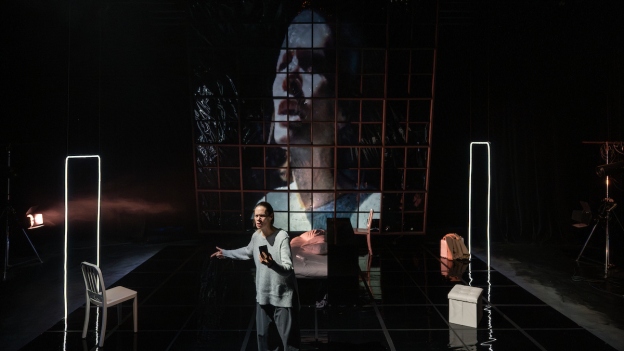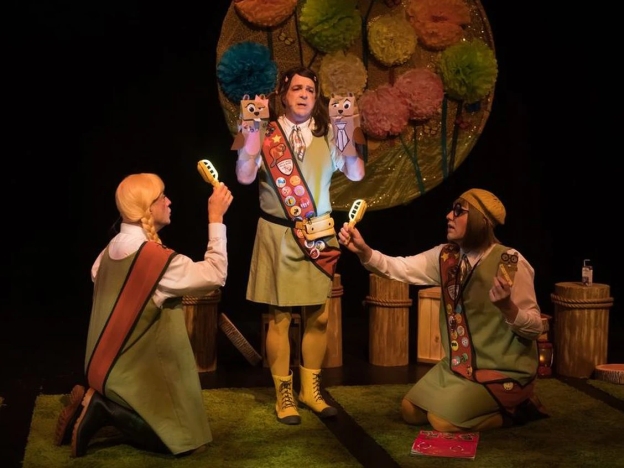Michelle Todd, foreground, and Michael Peng, Sydney Williams, and Brett Dahl, in Tiny Beautiful Things. Photo Marc Chalifoux.
If you haven’t already seen Tiny Beautiful Things, the Shadow Theatre production of the Nia Vardalos play currently running at the Varscona, do try to fit it in before it closes on Sunday afternoon.
Tiny Beautiful Things is a set of vignettes portraying the interactions of an advice-columnist, inspired by Cheryl Strayed’s essays based on her time writing as Dear Sugar. Michelle Todd is wonderful as the writer who lands the columnist gig, giving advice from her heart and from her own messy experiences. The character seemed so warm and human and honest, folding laundry in her house wearing mismatched loungewear/pajamas (Leona Brausen costumes), that I wanted to take her home.
The rest of the ensemble (Michael Peng, Sydney Williams, and Brett Dahl) portray people who write to her, and other people in her stories such as her mother. Each of them gets a chance to play people of various ages and genders, adding to the impression that there are a lot of different correspondents. I didn’t ever feel like any of the portrayals were caricatures.
During the performance, I was reminded of several other plays I’ve seen. The first comparison was with Veda Hille, Bill Richardson, and Amiel Gladstone’s Craigslist Cantata, the series of songs and sketches about transactional connections on an internet classified-ads site, but I quickly decided that Tiny Beautiful Things was less frivolous and more thoughtful, as the interactions through an advice-column were about seeking understanding, rather than finding second-hand property, missed-connections on a commute, or a metalhead roommate for a metal house (although that one was so catchy that now it’s an earworm again).
When I realized that the conversations between Sugar and the letter-writers, often physically located at Sugar’s kitchen table or in her living room, were being done without the actors touching, and usually facing towards the audience, I remembered Duncan MacMillan’s Lungs, also directed by John Hudson for Shadow Theatre, with Elena Porter and Jake Tkaczyk as an unnamed couple recollecting the milestones in their relationship, while speaking to an unseen listener and never touching, not even in the sometimes-hot sometimes-hilarious sex scenes. And then in one of Sugar’s conversations, they do touch, and it matters.
Sugar’s advice and support, completely grounded in love, and the heartbreaking range of the ordinary people’s problems, also reminded me of a newer script which none of you have seen yet, unless you’ve been in a rehearsal hall at Walterdale Theatre during preparations for next week’s new works festival From Cradle to Stage. The festival, running May 14-19, presents three staged readings each night, for a total of nine new scripts by local playwrights. I helped select them, so I think they’re all worth seeing – but the one that came to mind yesterday when I was watching Tiny Beautiful Things was Kristen M. Finlay’s Modern Day Saints. In Finlay’s script, ordinary contemporary women struggle to do the right thing in a range of difficult and painful and familiar situations, starting from a student without enough money to pay her tuition fees dealing with unsympathetic bureaucracy. As in Tiny Beautiful Things, the glimpses of compassion and hope in the ensemble vignettes are life-affirming.
Tiny Beautiful Things starts with an electronic tone, and then another – I thought, is that a message notification? is that a piece of original music? and then I thought, Oh, there’s a Darrin Hagen sound credit, I bet it is both. And it was.
It goes without saying that it made me cry. In a good way. It also made me feel grateful for having friends to tell life stories with, and for seeing how crafting an experience into a story helps make sense of it.
Tickets for Tiny Beautiful Things are here. Tickets for Walterdale’s From Cradle to Stage festival May 14-19 are here. Modern Day Saints plays on May 17 and May 18 – but descriptions of all the new plays in the festival, by Bridgette Boyko, Donna Call, Kristen M. Finlay, Grace Li, Shawn Marshall, Madi May, Blaine Newton, Logan Sundquist, and Michael Tay are here.









